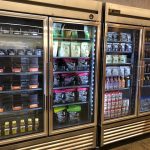A day late, but unlikely to be a dollar short, recreational sales kicked off with a big bang in West Hollywood, California; one of only two municipalities near Los Angeles County to begin licensing for legal recreational cannabis sales, when sales became legal yesterday, on January 1.
The city of Santa Ana, located in adjacent Orange County, saw sales launch at two dispensaries on New Year’s Day. California’s largest cannabis dispensary chain, Medmen, said their Santa Ana location saw four times the amount of business than on a typical day.
“Yesterday, in Santa Ana, was by far a record-breaking day,” MedMen Communications Director Daniel Yi said from the sales floor at the WeHo store, where he’s been doing interviews since yesterday. “We saw four times the average traffic. I can tell you the average spend was a little over $90 per transaction, which is average is about $67. So, not only did we see a lot more people, people are also buying a lot of pot.”
By 1pm on a mild, sunny Jan 2, the line-up for MedMen’s West Hollywood store stretched nearly a block east of the entrance, near the busy intersection of Santa Monica and Crescent Heights Blvds. Parking was hard to come by, with several news vans taking up the real estate in front of the store. Even with ample parking in back, cars circled, looking for an available spot.
“It’s been absolutely nuts today,” Yi continued. “I think part of it is that this is one of ten shops in the larger L.A. area licensed to sell adult use. So, as we stand here today, January 2, only Santa Ana and the city of West Hollywood have issued adult use licenses, and then the state has to issue licenses.
“We’re experiencing huge traffic, as you can see, and I think there’s also a bit of a celebratory mood. This is a huge milestone for California and for the nation. As we move the needle toward eventually end of federal prohibition. Colorado took the first step, but California is going to be advancing the conversation a hundred fold–so this is really a historic moment,” Yi described.
Those at the front of the line for entry said they’d been waiting an hour-and-a-half, but none appeared perturbed by the wait. A constant round of newscasters entertained, shooting exterior commentary, though several line-standers discreetly declined to be interviewed on-camera. Inside, a dozen or more red-shirted budtenders showed customers around to in-store displays of various products. One customer asked for a product that would help arthritis.
Budtender Lady Red explained the new taxation situation with great patience, which is a new experience, even for experienced medical rec patients. She said customers without any certification pay a 35 percent tax on purchases, while Californians with doctor’s certifications that have not been issued by Los Angeles County are charged 15 percent in tax. Those with a county-issued medical card are not charged tax.
“Tax is going to a reality of any regulated market, right?” Yi pointed out. “Someone has to pay for the Bureau of Cannabis Control. When you go to a restaurant, you pay sales taxes. Cannabis is obviously a controlled substance, and we all are doing our share in regards to buttressing the state and local budgets, but it’s going to be an ongoing conversation.”
“More importantly, we want to make sure that now that we have regulations in place, it’s very important that we enforce the law. We should not allow illegal dispensaries or illegal activities. Along with an open conversation about taxes,” he emphasized. With up to 500 noncompliant dispensaries in the Los Angeles area, it’s an issue bound to become more significant, as licensing expands.
But on this history-making day, none of the customers at MedMen seemed dissuaded or daunted by paying more for taxes. For those without patient certification, it appeared they were just happy to be able to purchase cannabis products.
“Obviously, nobody likes to pay more on anything they buy,” Yi reasoned. “But taxes are a reality. For most people, cannabis is not huge portion of their budget. Unless you’re a high volume medical marijuana patient, most use it as a wellness product, to help with day-to-day pain management–this is more like a supplement. If taxes get too onerous, we’ll have that conversation as a community.”
In regards to getting ready for the big day, it’s something MedMen has been preparing for, for months, according to Yi. Getting compliant with new regulations in time for today was the biggest challenge–everything else depends on how the whole recreational business model begins to roll-out.
“We prepared for any eventuality. So, there were two things that happened in terms of us preparing. One thing was stocking up product because it will be a big, bumpy transition, so we wanted to prepare for possible disruptions in the supply chain. So we stocked up. And second, were all the compliance requirements. So, December 31st, while a lot of people were celebrating and drinking champagne, our staff members were making sure to get rid of all the products that was not compliant, like transparent packaging, for instance, or any edibles in the shape of animals that are now prohibited. Also stocking all the stores with what we call ‘exit bags,’ to make sure they’re childproof, which is now required. So compliance has been a huge part of our preparation. And we staffed up, and have a lot of people on-call.”



















